Notebook - May 17, 2000
The Tiger will roar a bit louder
Trustees vote to increase size of student body
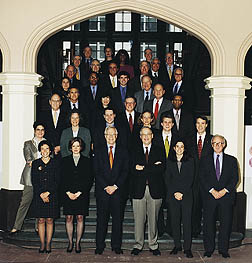 Princeton is changing in at least one fundamental way: It will grow
larger. On April 15, the Board of Trustees approved the recommendations
of the Wythes Committee, which included the proposal to increase the undergraduate
student body by 500, or 10 percent, over the next five to six years. Other
recommendations relating to the faculty, the Graduate School, staff, physical
resources, financial resources, new technologies, and the library were also
approved.
Princeton is changing in at least one fundamental way: It will grow
larger. On April 15, the Board of Trustees approved the recommendations
of the Wythes Committee, which included the proposal to increase the undergraduate
student body by 500, or 10 percent, over the next five to six years. Other
recommendations relating to the faculty, the Graduate School, staff, physical
resources, financial resources, new technologies, and the library were also
approved.
There is no question in anybody's mind that Princeton is formidable-in
the quality of its students, faculty, and other resources. There were only
two main questions for the committee: Can Princeton be improved, and if
Princeton is so good, shouldn't it be available to more people? The answer
to both those questions the trustees decided, was "yes."
Improvements to Princeton will fall mainly in the realm of stewardship
and management, upgrading existing facilities, and continued development
of new technologies and distance learning.
As for those new incoming students, exactly who will be admitted? It
is expected that the additional 125 students per year will further diversify
the current enrollment in terms of intellectual engagement, race, and nationality.
In the spring of 1998, a committee called the Faculty Study Group on
Undergraduate Admissions began to meet. The committee wanted to find a way
to "increase the proportion of academically excellent students at Princeton
and to further diversify the student body." Committee member John Gager,
a professor of religion, was quoted in the November 18, 1998, paw as saying,
"Under the current system, with slots allocated for recruited athletes,
legacies, and other special categories, there's not a lot of room for maneuvering."
The only way to increase the number of academic 1's and 2's (ratings given
to students of the highest caliber) would be to refuse admission to some
students (athletes, legacies, and other categories), which was not considered
an option. Consequently, one of the committee's four recommendations was
to increase the size of each entering class by 125-150 students.
The Wythes Committee, named for its chair, Trustee Paul Wythes '55, apparently
came to the same conclusion as the faculty committee. All that remains for
implementation is a sixth residential college to accommodate a larger student
body and the green light from Dean of Admission Fred Hargadon.-L.O.
So, what do you think?
After the board of trustees approved all the recommendations of the Wythes
Committee on April 15, the main thrust-increasing the size of the undergraduate
student body-was the focus of alumni registered on the university's online
discussion group Princeton Matters. During the nearly three months between
the publishing of the recommendations and their adoption, online alumni
traded opinions about a larger Princeton. Implicit in most exchanges was
the concern: Will a larger student body change the nature of Princeton in
an essential way?
Alumni have also been debating, without resolution, several other questions:
At what point does Princeton cease to be considered a small school? If diversity
is the goal, why can't that be accomplished in the current student enrollment
of 4,600? Why did the question of size come up at all, and who first raised
it? Does a larger student body stop here, or will there be more increases
down the road?
The online discourse has been for the most part civil, sometimes cynical,
and mostly respectful of the many alumni who were members of the Wythes
Committee, or who have volunteered to help steer Princeton over the past
few years. What comes through above all-and it's no surprise-is that alumni
care passionately about their alma mater.
Current students seem concerned about whether the nature of Princeton
would change but are more interested in the possible degradation of campus
life additional students would bring. Many feel that there are existing
problems not being addressed adequately by the university administration.
According to an Undergraduate Student Government statement, the main
concerns are: too few professors to advise students in the popular departments;
preceptorials with as many as 20 students; lack of diversity among the faculty;
an overburdened career services office; too few performance spaces; overcrowded
workout areas in the gym; and insufficient funding for student activities.
Via the Internet and The Daily Princetonian, and through P. J. Kim '01,
USG president, students expressed further worries: limited social options;
limited practice space for musicians; small, crowded dormitory rooms; a
lack of cultural and ethnic diversity among the student population; and
library and registrar systems that need updating.
Before the trustees met in April, the USG prepared a statement for the
Wythes Committee to consider, and as a result, the committee revised some
of its language to be more explicit about its commitment to the report.
Both the report and the USG statement are available online: Wythes Report,
www.princeton.edu/pr/reports/wythes; USG statement, ww.princeton.edu/usg/wythes.
Meanwhile, several administrative departments are involved and are committed
to resolving, or at least responding to, specific student concerns. In our
June 7 issue, we plan to publish details about the administration's response.-L.O.
Princeton poet wins Pulitzer
Professor C. K. Williams on April 10 won the Pulitzer Prize for his book
Repair (Farrar, Straus and Giroux, 1999), a collection of nearly 40 poems
spanning themes of love, memory, social disorder, and the natural world.
Williams learned of his prize during the afternoon while he was teaching
Translation and Adaptation for the Theater. He was called from the room
by a program secretary to see his wife, who was waiting in the hall to tell
him the news. The Daily Princetonian reported that Amanda Whitehead '00,
a student in the class, said, "He disappeared from class randomly,
then I heard laughter in the hallway. He walked back in, sat down, and said,
'I just won the Pulitzer Prize.'" The class broke into applause.
Williams, a lecturer with the rank of professor in the Council of the
Humanities and Creative Writing, has been at Princeton for five years and
teaches writing, poetry, and dramatic adaptation and translation. Williams
earned his bachelor's degree in English from the University of Pennsylvania.
He divides his time between Princeton and Paris.
Williams has written 15 other books of poetry, including Flesh and Blood
(Noonday, 1988), which won the National Book Critics Circle Award and was
a finalist for the Pulitzer, and The Vigil (Noonday, 1998), which was nominated
in 1996 for a Pulitzer. He has edited collections of poetry and essays and
is the author of three works in translation. His most recent book is Misgivings,
described as an "autobiographical meditation" (Farrar, Straus
and Giroux, 2000).
Technology specialist Ira Fuchs
goes to Mellon Foundation
Princeton's vice president for computing will maintain ties to the
university
Ira Fuchs, who has been the university's vice president for computing
and information technology for the past 15 years, has accepted a job at
the Mellon Foundation as vice president for research in information technology,
a new position. He will begin July 1.
Fuchs, who has been a leader both on campus and nationally in creating,
developing, and fostering ways to apply information technology, will spend
one day a week advising senior leadership at Princeton in the use of digital
technology.
In a statement, Fuchs said, "The potential applications of information
technology to scholarship in the arts and humanities have only begun to
be tapped. Emerging new technologies promise important advances for research,
teaching, and learning, and the Mellon Foundation is at the forefront of
such initiatives." The Mellon Foundation's president is William G.
Bowen *58, former president of the university.
In search of a class: "Yes!"
letters sent out
The acceptance letters are out, and 1,670 high school seniors must now
decide if Princeton is the place for them to pursue their college educations.
Having received 13,654 applications, Dean of Admission Fred Hargadon
had the task of whittling that number down by 87.8 percent to decide who
would best form the Class of 2004. "As has been true for many years,
our applicant group this year included several thousand terrific young men
and women to whom we could not offer admission but whom we'd have been happy
to admit were our freshman class larger than it is," Hargadon said.
He expects the class to wind up with 1,166 members.
This year's acceptance rate, 12.2 percent, is slightly higher than last
year's, which was 11.3 percent of a record 14,875 applicants. This year
50 percent of the admittees are women, 35 percent are minorities, 9 percent
are international students, and 10 percent are children of alumni. Of this
year's applicants, 52 percent had SAT scores of 1400 or higher, 52 percent
had grade-point averages of 3.8 or higher, including more than 4,000 with
4.0 GPAs.
Duke's Dickerson to head campus
life
New vice president position created for her
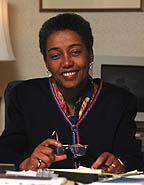 Janet Smith Dickerson, vice president for student affairs at Duke University,
has been appointed to the new position of vice president for campus life,
effective July 1. She succeeds Janina Montero, who was dean of student life
for six years until this past January, when she left to become vice president
for campus life at Brown University.
Janet Smith Dickerson, vice president for student affairs at Duke University,
has been appointed to the new position of vice president for campus life,
effective July 1. She succeeds Janina Montero, who was dean of student life
for six years until this past January, when she left to become vice president
for campus life at Brown University.
As vice president for campus life, Dickerson will oversee the office
of the dean of undergraduate students, the Department of Athletics, the
University Health Services, and the office of the dean of religious life
and of the chapel. She will also work with the Graduate School to enhance
the quality of graduate student life and will oversee the new Frist Campus
Center. She will report to Vice President and Secretary Thomas Wright '62.
Dickerson earned her B.A. in English from Western College for Women and
her M.Ed. from Xavier University. She studied in the Ed.D. program at the
University of Pennsylvania and at Harvard's Institute for Educational Management.
Before her appointment at Duke, where she worked for nine years, she was
dean of the college at Swarthmore for 10 years.
Dickerson is Princeton's first African-American female vice president.
Previously, the highest ranking African-American woman was former vice provost
Ruth Simmons, who left Princeton in 1995 to become president of Smith College.
Theatre Intime closes for renovation
Reunion show will go on in adjacent courtyard
 Theatre Intime will close May 20 while its theater space undergoes its
first major renovation since June 1933, when it was gutted by fire. This
year's reunion show, The Duck Variations by David Mamet, directed by Sarah
Rodriguez '03, will be performed May 25-27 in the Class of 1969 Memorial
Garden, next to Murray Theater.
Theatre Intime will close May 20 while its theater space undergoes its
first major renovation since June 1933, when it was gutted by fire. This
year's reunion show, The Duck Variations by David Mamet, directed by Sarah
Rodriguez '03, will be performed May 25-27 in the Class of 1969 Memorial
Garden, next to Murray Theater.
The renovation, which should be complete by the end of August, will include
a dramatically improved lobby and box office area. The 200 seats in the
theater, which are uncomfortable for even the most padded of behinds, will
be replaced. Another major improvement involves reconfiguring the space
in the basement, including the shop, dressing rooms, and bathrooms. In addition,
modifications to the stairs, exits, and safety systems will be made.
In the past few years, improvements to the lighting, sound, and other
technical areas have been made, and will be incorporated in this latest
renovation.
Funding for the refurbishment, a projected $700,000, is coming from the
Friends of Theatre Intime and the university's 250th Anniversary Campaign.
Intime's first performance was in February 1920 in a dormitory room in
Witherspoon Hall; a blanket served as a curtain. The following year, the
theater group, which has always been run by students, moved into Murray-Dodge
Hall and became an official campus organization. n
Renowned economist joins faculty
Paul R. Krugman, a professor of economics at the Massachusetts Institute
of Technology and a New York Times columnist, will join the faculty this
summer in a joint appointment with the Woodrow Wilson School and the economics
department, according to The New York Times.
The Times reported on April 18 that Krugman will teach three courses
every two semesters, which is half his load at M.I.T. The paper also reported
his salary: "His appointment, effective this summer, carries the same
salary, he said, as at M.I.T., between $150,000 and $200,000 a year."
According to the Times, one factor in Krugman deciding to leave Massachusetts
was the fact that his parents recently moved to a retirement center near
Princeton.
The appointment will become official when the trustees approve the hire
May 29.
According to The Daily Princetonian, Krugman has taught a variety of
classes at M.I.T., from introductory economics to graduate seminars in international
trade. Krugman will continue to write his twice-weekly Op-Ed column for
the Times.
Woodrow Wilson School Dean Michael Rothschild welcomes Krugman: "Paul
Krugman is an economist extraordinaire. He writes more clearly and more
sharply, and thinks faster, more deeply, and with more originality than
almost anyone in the profession."
Krugman earned a B.A. from Yale and a Ph.D. from M.I.T. In 1991 he won
the John Bates Clark Medal, which is awarded every two years by the American
Economic Association to a prominent economist under 40. In addition to having
written or edited 18 books, he writes for the online magazine Slate, Fortune
magazine, and other periodicals. n
Are women interested in economics?
A recent study suggests a way to improve the numbers
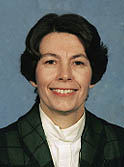 Of the undergraduates who gravitate to Princeton's most
popular major-economics-only about a third are women. A new study suggests
ways to improve that number.
Of the undergraduates who gravitate to Princeton's most
popular major-economics-only about a third are women. A new study suggests
ways to improve that number.
Two economists at Hamilton College say women are more likely to stick
with economics if their introductory course devotes time to group problem-solving,
if its classes are graded on a curve, and if it covers topics thought of
as especially interesting to women (e.g., women's participation in the workforce).
Their findings were reported at the annual American Economic Association
meeting in January.
Princeton's introductory courses, Economics 101 and 102, are lecture
courses supplemented by smaller precepts, where problem-solving takes place.
Economics 101 covers the national economy; 102 delves into the description
and analysis of price systems. Grades are determined by performance on exams,
papers, and exercises, with weights determined by the professor.
In the past five years, the number of female economics majors has grown
incrementally from 53 of 210 students in 199596, to 79 of 253 this
year. Professor Elizabeth Bogan, who teaches both introductory courses and
precepts
for them, includes a unit in Economics 102 on women in the labor market.
She reports that the trend is toward a more theoretical-read mathematical-approach.
In her opinion, female students might come out in larger numbers for policy-oriented
courses.
"I'm always interested in attracting female and male students to
major in economics, but I try extra hard with my female students,"
says Bogan. "I try throughout the course to show that economics answers
really interesting questions about how the world works." n
-Maria LoBiondo
Are unions going the way of the
dodo?
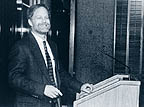 Paw talked recently with Henry Farber, the Hughes-Rogers professor of
economics, about labor unions, which have seen declines in membership since
1973.
Paw talked recently with Henry Farber, the Hughes-Rogers professor of
economics, about labor unions, which have seen declines in membership since
1973.
Labor unions have won some highly publicized organizing campaigns
in the past few years. Does this mean unions are making a comeback?
We tend to expect in a strong labor market that unions will be more successful
in organizing than in a weak labor market. While the 1990s have been a period
of almost unprecedented prosperity, the union movement in the private sector
has not grown at all and, in fact, has shrunk during the decade.
What factors do you think are responsible for the recent organizing
campaigns that were successful?
Some of the big organizing campaigns that have been won have been in
service industries. Unions won a big organizing campaign among hotel and
restaurant employees in Las Vegas, and they won another in Los Angeles where
they organized home-care workers. If unions are going to be more successful,
they have to move from a manufacturing base to a service-oriented base.
Some economic data show widening disparity in wage and salary gains
between the lowest-paying and highest-paying jobs. What effect will this
have on unions?
The increased earnings inequality in the 1980s that persists to this
day does not seem to be providing any incentive for workers to organize.
Not enough workers are interested in unionization and that's the problem
for unions: to convince workers they provide something of value in the workplace.
Will organized labor be relevant in the changing economy of the new
millennium?
I see the union movement continuing to lose membership share in the private
sector. I expect it to stay stable in the public sector. We're going to
live in a world where the private sector is largely nonunion.
In what areas do you see possible future labor union growth?
We live in a world of incredible capital mobility, so if owners of capital
perceive it's too expensive to produce in the U.S., they'll just move. For
example, there's a substantial computer programming industry in India. U.S.
companies that need programming can subcontract it out to Indian programmers,
making even that very high-tech industry susceptible to foreign competition.
Only certain parts of the service sector, like food and restaurants, where
firms need to be physically proximate to their customers, are not sensitive
to foreign competition. Even the daily reconciliation of financial transactions
can be done anywhere in the world because of modern communication technology.
It makes it very, very hard to see where the labor movement can carve out
a niche for itself where jobs aren't going to flee if labor costs increase.
In Brief
Recently the Princeton Regional Health Commission has been debating the
merits of banning smoking in all public places. Perhaps it should approve
a ban on smoking at construction sites. On Thursday, March 23, a fire broke
out in construction materials stacked on the roof of the new Frist Campus
Center, scheduled to open in September. The fire, which caused no damage
to the building and was put out within 40 minutes by local firefighters,
started as a result of "careless smoking by rooftop workmen,"
according to the borough's Bureau of Fire Safety. Paul Breitman, Frist Center
director, said that the fire would not alter the construction schedule.
Four days after the Frist roof fire, East Pyne was evacuated for about
five hours after Public Safety received a telephone call declaring that
a bomb had been placed in Chancellor Green Cafe. The anonymous call, which
was made from a Student Center phone, came at 9:34 a.m. Public Safety personnel
arrived within four minutes, and the local fire department came a bit later
with bomb-sniffing dogs that searched the building, finding no bomb. At
3:08 p.m., the building was declared safe to reenter. The culprit has yet
to be caught.
It isn't only students who are learning lessons at Princeton. After two
university maintenance employees lost a master key that opens 25 percent
of the dorm rooms on campus, forcing the university to install new locks
in more than 800 doors, Barry Weiser, crime prevention specialist, is quoted
in The Daily Princetonian as saying, "The university has learned from
this catastrophic breakdown. Locks in separate buildings will be sub-mastered
in the future so a single loss of a key won't affect so many dorms. We have
learned our lesson."
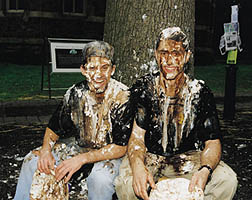 The rain that fell on Saturday, April 15, did not deter the students
who took part in the 23rd annual Communiversity celebration. Sponsored by
students and the Arts Council of Princeton, Communiversity offered games,
food, music, and dance to the 4,000 visitors, many of whom were children,
who took the wet stuff in stride. This year, the International Festival,
which in previous years had held a separate event, merged with Communiversity,
providing a richer mix to the afternoon.
The rain that fell on Saturday, April 15, did not deter the students
who took part in the 23rd annual Communiversity celebration. Sponsored by
students and the Arts Council of Princeton, Communiversity offered games,
food, music, and dance to the 4,000 visitors, many of whom were children,
who took the wet stuff in stride. This year, the International Festival,
which in previous years had held a separate event, merged with Communiversity,
providing a richer mix to the afternoon.
On Friday, April 14, the Women's Center organized a panel discussion
in honor of the 30th anniversary of undergraduate women at Princeton. Called
"Women, Power, and Leadership," the panel, which included Patricia
Garcia-Monet '92 (former USG president), Cecilia Rey Hallisey '88 (former
USG president), Jennifer Jennings '00 (former cochair of the Student Volunteers
Council), Nancy Peretsman '76 (managing director of Allen & Co.), Susan
Rea '00 (Marshall Scholar), and Janelle Wright '00 (former chair of the
Third World Center governing board), discussed the issues of women in power
and women leaders on campus and in the world. The discussion was moderated
by Stephanie Ramos '00.
Three Princetonians received the Paul and Daisy Soros Foundation Fellowships
for New Americans, which support graduate education for outstanding children
of immigrants. They are: Tamar Friedmann '98, Luis Diego Garcia '00, and
Neysun Mahboubi '97. The program grants half the cost of graduate study
at any institution of higher learning in the U.S. as well as an annual grant
of $20,000 for two years. Each year the program awards 30 grants; this year
740 applied.
Last month four professors were named Guggenheim Fellows and will receive
stipends to support their research: April Alliston, associate professor
of comparative literature, for research on "Character, plausibility,
and gender in French and English historical narratives, 1650-1850";
Jennifer L. Hochschild, William Stewart Tod professor of politics and public
affairs, for research on "The prospects for democratic pluralism in
the U.S."; Peter Jeffery, professor of music, for research on "The
earliest manuscript of the Roman chant tradition"; and Claudia L. Johnson,
professor of English, for research on "Jane Austen's status as a legend."
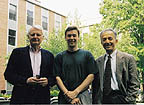 When Ryan Hayward '99 turned in his senior thesis last year to professors
of chemical engineering Ilhan Aksay and Dudley Saville, he did not know
that his work, which deals with the way particles arrange themselves on
surfaces, offered breakthrough information that would be published in the
March 2 issue of the science magazine Nature.
When Ryan Hayward '99 turned in his senior thesis last year to professors
of chemical engineering Ilhan Aksay and Dudley Saville, he did not know
that his work, which deals with the way particles arrange themselves on
surfaces, offered breakthrough information that would be published in the
March 2 issue of the science magazine Nature.
Hayward, who is a Ph.D. candidate at the University of California, Santa
Barbara, figured out a way to use ultraviolet light to manipulate particles
into patterns. Practical applications fall into the fields of biotechnology
and microelectronics.
Talks on Campus
Actor John Turturro was at Princeton on April 5 to take part in a discussion
about the Italian filmmaker Francesco Rosi, whose film The Truce, which
was based on the autobiographical novel by Primo Levi, starred Turturro
as Levi.
Isaias Afworki, president of Eritrea, spoke on campus on April 10 about
the "Conflict and Challenge of Development in Africa: The Case of the
Horn of Africa."
Zbigniew Brzezinski, national security adviser to President Jimmy Carter
(1977-81), delivered the 2000 Cyril Black Memorial Lecture, "The Transformation
of Russia" on April 12.
Senator John D. Rockefeller IV lectured on "There's Nothing Wrong
with Public Service," on April 18.
Ahmed Aboul Gheit, permanent representative of Egypt to the U.N., and
Yehuda Lancry, permanent representative of Israel to the U.N., spoke on
April 17 at a lecture entitled "Light at the End of the Tunnel? Costs
and Benefits of Mideast Peace for the International Community."
Benita Ferrero-Waldner, Austria's federal minister for foreign affairs,
lectured on "Austria, the European Union and the United States,"
on April 18. Ferrero-Waldner is Austria's top foreign-policy official; she
was in the U.S. to work on a resolution to the current problems of political
isolation of Austria. n
reunions time
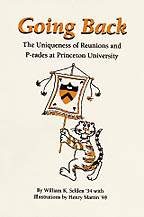 Planning to come back to Reunions, and you know next to nothing about
its history? To wow everyone with your knowledge of the annual black-and-orange
blast, you might want to take a look at a new pamphlet that details its
history and pageantry. Written by William K. Selden '34 and illustrated
by Henry Martin '48, the booklet, Going Back: The Uniqueness of Reunions
and P-rades at Princeton University, is available at the University Store,
$3.95, 609-921-8500.
Planning to come back to Reunions, and you know next to nothing about
its history? To wow everyone with your knowledge of the annual black-and-orange
blast, you might want to take a look at a new pamphlet that details its
history and pageantry. Written by William K. Selden '34 and illustrated
by Henry Martin '48, the booklet, Going Back: The Uniqueness of Reunions
and P-rades at Princeton University, is available at the University Store,
$3.95, 609-921-8500.
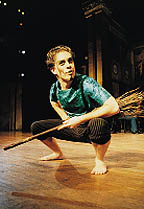 If you're on campus for Reunions and if you have Shakespeare on your
mind (and who doesn't at Reunions?), you could while away an hour or two
watching Princeton Shakespeare Company's A Midsummer Night's Dream, performed
with incidental music by Felix Mendelssohn and played by members of the
University Orchestra. Showtimes are Thursday and Friday, May 25 and 26,
at 7:30 p.m. in Richardson Auditorium. Tickets are $15.
If you're on campus for Reunions and if you have Shakespeare on your
mind (and who doesn't at Reunions?), you could while away an hour or two
watching Princeton Shakespeare Company's A Midsummer Night's Dream, performed
with incidental music by Felix Mendelssohn and played by members of the
University Orchestra. Showtimes are Thursday and Friday, May 25 and 26,
at 7:30 p.m. in Richardson Auditorium. Tickets are $15.
In search of the real Cuba
Students travel south to find answers, open debate
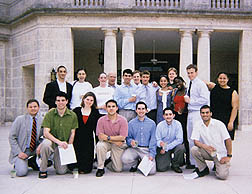 It was probably inevitable that Bill Potter '68's Latin American politics
precept would end up in Cuba. Potter, who spent the summer of 1967 in Bolivia
searching for Che Guevara to interview for his thesis, had tried two other
times to make it to the island nation but had to cancel for various reasons.
It was probably inevitable that Bill Potter '68's Latin American politics
precept would end up in Cuba. Potter, who spent the summer of 1967 in Bolivia
searching for Che Guevara to interview for his thesis, had tried two other
times to make it to the island nation but had to cancel for various reasons.
So when students in his class, a precept for professor Paul Sigmund's
Latin American politics course, started questioning some of the realities
of Cuban life-for example, how could a dictatorship with one-seventh the
per-capita income of Mexico have the low infant mortality and high literacy
rates of a Western European country?-Potter threw out an off-handed challenge.
"Why don't you go and see for yourselves?" he said. "I'll
go with you."
The students took him seriously. "The issue [of Cuban-U.S. relations]
is so urgent," said Jill Otto, a sophomore from Brazil who coordinated
the trip. "Cuba is physically so close, and the U.S. has such an impact,
we thought that we as academics might provide another framework for the
debate and more objective information. We are hoping to create a voice from
the U.S. academic perspective."
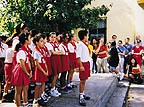 Calling their initiative Princeton in Cuba, the students decided they
would go over spring break-just a couple of months away-and began feverishly
to plan. Otto initiated negotiations with the Cuban ministry for visas and
scheduled speakers and seminars. Christina Franks '02 started working on
flight arrangements-a challenge given the restrictions on U.S.-Cuba travel.
Toju Ukueberuwa '02 handled the finances. Mario Moya '01 arranged housing.
Faculty members Jeremy Adelman, associate history professor and director
of the Latin American Studies program, and Stanley Katz, public and international
affairs professor, along with Latin American Studies program assistant Rose
Rivera, provided guidance and support. And David Myhre, the executive director
of the Latin American Studies program, arranged for each student to receive
an academic license, required to travel to Cuba.
Calling their initiative Princeton in Cuba, the students decided they
would go over spring break-just a couple of months away-and began feverishly
to plan. Otto initiated negotiations with the Cuban ministry for visas and
scheduled speakers and seminars. Christina Franks '02 started working on
flight arrangements-a challenge given the restrictions on U.S.-Cuba travel.
Toju Ukueberuwa '02 handled the finances. Mario Moya '01 arranged housing.
Faculty members Jeremy Adelman, associate history professor and director
of the Latin American Studies program, and Stanley Katz, public and international
affairs professor, along with Latin American Studies program assistant Rose
Rivera, provided guidance and support. And David Myhre, the executive director
of the Latin American Studies program, arranged for each student to receive
an academic license, required to travel to Cuba.
In the end, Otto said, "the impossible happened: We managed to leave
and we managed to come back." Seventeen undergraduates, not all of
them from Potter's precept, and three faculty members-Potter, sociology
lecturer Patricia Fernandez-Kelly, and assistant politics professor Kent
Eaton-made the trip. Staying at a 16th-century converted convent in Old
Havana, the students traveled the countryside by hired car, toured museums
and schools, and walked the streets of the city. In addition to conducting
independent research, the group attended four seminars conducted (all but
one in Spanish) by faculty from the University of Havana on architectural
restoration, the state of the Cuban population, education, and health care.
The international flavor of the group-students came from a wide range
of states and two foreign countries-added a dimension to the trip. Otto
readily said that, as a Brazilian, she had a romanticized view of Cuba.
Latin and South Americans, she explained, admire Cuba because "they
did it"-implemented change in contrast to other Latin American countries.
"Americans have a different view-the red threat," Otto said.
Potter, a lawyer in his nonacademic life, hopes the trip will become
an annual one, structured around the independent research interests of students,
funded by an endowment, and organized by the Latin American Studies program.
He isn't in search of revolution anymore. "I would hope that the program
would be a conduit for people and information to go to Cuba and from Cuba
to the U.S.," he said. "I would hope that people will become energized
about Cuban-U.S. policy issues. And I would hope that Princeton would be
in the forefront of a peaceful transition for Cuba." -J.C.M.
GO TO
the Table of Contents of the current issue
GO TO
PAW's home page
paw@princeton.edu
 Princeton is changing in at least one fundamental way: It will grow
larger. On April 15, the Board of Trustees approved the recommendations
of the Wythes Committee, which included the proposal to increase the undergraduate
student body by 500, or 10 percent, over the next five to six years. Other
recommendations relating to the faculty, the Graduate School, staff, physical
resources, financial resources, new technologies, and the library were also
approved.
Princeton is changing in at least one fundamental way: It will grow
larger. On April 15, the Board of Trustees approved the recommendations
of the Wythes Committee, which included the proposal to increase the undergraduate
student body by 500, or 10 percent, over the next five to six years. Other
recommendations relating to the faculty, the Graduate School, staff, physical
resources, financial resources, new technologies, and the library were also
approved. Janet Smith Dickerson, vice president for student affairs at Duke University,
has been appointed to the new position of vice president for campus life,
effective July 1. She succeeds Janina Montero, who was dean of student life
for six years until this past January, when she left to become vice president
for campus life at Brown University.
Janet Smith Dickerson, vice president for student affairs at Duke University,
has been appointed to the new position of vice president for campus life,
effective July 1. She succeeds Janina Montero, who was dean of student life
for six years until this past January, when she left to become vice president
for campus life at Brown University. Theatre Intime will close May 20 while its theater space undergoes its
first major renovation since June 1933, when it was gutted by fire. This
year's reunion show, The Duck Variations by David Mamet, directed by Sarah
Rodriguez '03, will be performed May 25-27 in the Class of 1969 Memorial
Garden, next to Murray Theater.
Theatre Intime will close May 20 while its theater space undergoes its
first major renovation since June 1933, when it was gutted by fire. This
year's reunion show, The Duck Variations by David Mamet, directed by Sarah
Rodriguez '03, will be performed May 25-27 in the Class of 1969 Memorial
Garden, next to Murray Theater. Of the undergraduates who gravitate to Princeton's most
popular major-economics-only about a third are women. A new study suggests
ways to improve that number.
Of the undergraduates who gravitate to Princeton's most
popular major-economics-only about a third are women. A new study suggests
ways to improve that number. Paw talked recently with Henry Farber, the Hughes-Rogers professor of
economics, about labor unions, which have seen declines in membership since
1973.
Paw talked recently with Henry Farber, the Hughes-Rogers professor of
economics, about labor unions, which have seen declines in membership since
1973. The rain that fell on Saturday, April 15, did not deter the students
who took part in the 23rd annual Communiversity celebration. Sponsored by
students and the Arts Council of Princeton, Communiversity offered games,
food, music, and dance to the 4,000 visitors, many of whom were children,
who took the wet stuff in stride. This year, the International Festival,
which in previous years had held a separate event, merged with Communiversity,
providing a richer mix to the afternoon.
The rain that fell on Saturday, April 15, did not deter the students
who took part in the 23rd annual Communiversity celebration. Sponsored by
students and the Arts Council of Princeton, Communiversity offered games,
food, music, and dance to the 4,000 visitors, many of whom were children,
who took the wet stuff in stride. This year, the International Festival,
which in previous years had held a separate event, merged with Communiversity,
providing a richer mix to the afternoon. When Ryan Hayward '99 turned in his senior thesis last year to professors
of chemical engineering Ilhan Aksay and Dudley Saville, he did not know
that his work, which deals with the way particles arrange themselves on
surfaces, offered breakthrough information that would be published in the
March 2 issue of the science magazine Nature.
When Ryan Hayward '99 turned in his senior thesis last year to professors
of chemical engineering Ilhan Aksay and Dudley Saville, he did not know
that his work, which deals with the way particles arrange themselves on
surfaces, offered breakthrough information that would be published in the
March 2 issue of the science magazine Nature. Planning to come back to Reunions, and you know next to nothing about
its history? To wow everyone with your knowledge of the annual black-and-orange
blast, you might want to take a look at a new pamphlet that details its
history and pageantry. Written by William K. Selden '34 and illustrated
by Henry Martin '48, the booklet, Going Back: The Uniqueness of Reunions
and P-rades at Princeton University, is available at the University Store,
$3.95, 609-921-8500.
Planning to come back to Reunions, and you know next to nothing about
its history? To wow everyone with your knowledge of the annual black-and-orange
blast, you might want to take a look at a new pamphlet that details its
history and pageantry. Written by William K. Selden '34 and illustrated
by Henry Martin '48, the booklet, Going Back: The Uniqueness of Reunions
and P-rades at Princeton University, is available at the University Store,
$3.95, 609-921-8500. If you're on campus for Reunions and if you have Shakespeare on your
mind (and who doesn't at Reunions?), you could while away an hour or two
watching Princeton Shakespeare Company's A Midsummer Night's Dream, performed
with incidental music by Felix Mendelssohn and played by members of the
University Orchestra. Showtimes are Thursday and Friday, May 25 and 26,
at 7:30 p.m. in Richardson Auditorium. Tickets are $15.
If you're on campus for Reunions and if you have Shakespeare on your
mind (and who doesn't at Reunions?), you could while away an hour or two
watching Princeton Shakespeare Company's A Midsummer Night's Dream, performed
with incidental music by Felix Mendelssohn and played by members of the
University Orchestra. Showtimes are Thursday and Friday, May 25 and 26,
at 7:30 p.m. in Richardson Auditorium. Tickets are $15.  It was probably inevitable that Bill Potter '68's Latin American politics
precept would end up in Cuba. Potter, who spent the summer of 1967 in Bolivia
searching for Che Guevara to interview for his thesis, had tried two other
times to make it to the island nation but had to cancel for various reasons.
It was probably inevitable that Bill Potter '68's Latin American politics
precept would end up in Cuba. Potter, who spent the summer of 1967 in Bolivia
searching for Che Guevara to interview for his thesis, had tried two other
times to make it to the island nation but had to cancel for various reasons. Calling their initiative Princeton in Cuba, the students decided they
would go over spring break-just a couple of months away-and began feverishly
to plan. Otto initiated negotiations with the Cuban ministry for visas and
scheduled speakers and seminars. Christina Franks '02 started working on
flight arrangements-a challenge given the restrictions on U.S.-Cuba travel.
Toju Ukueberuwa '02 handled the finances. Mario Moya '01 arranged housing.
Faculty members Jeremy Adelman, associate history professor and director
of the Latin American Studies program, and Stanley Katz, public and international
affairs professor, along with Latin American Studies program assistant Rose
Rivera, provided guidance and support. And David Myhre, the executive director
of the Latin American Studies program, arranged for each student to receive
an academic license, required to travel to Cuba.
Calling their initiative Princeton in Cuba, the students decided they
would go over spring break-just a couple of months away-and began feverishly
to plan. Otto initiated negotiations with the Cuban ministry for visas and
scheduled speakers and seminars. Christina Franks '02 started working on
flight arrangements-a challenge given the restrictions on U.S.-Cuba travel.
Toju Ukueberuwa '02 handled the finances. Mario Moya '01 arranged housing.
Faculty members Jeremy Adelman, associate history professor and director
of the Latin American Studies program, and Stanley Katz, public and international
affairs professor, along with Latin American Studies program assistant Rose
Rivera, provided guidance and support. And David Myhre, the executive director
of the Latin American Studies program, arranged for each student to receive
an academic license, required to travel to Cuba.